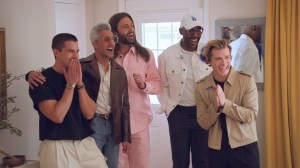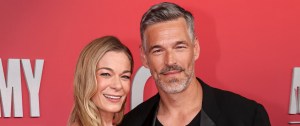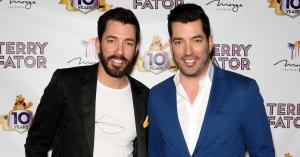As the world prepares to celebrate 30 years of the Hubble Space Telescope, astronaut Mike Massimino is reflecting on how one of the most notable technological achievements of all time changed not only the way we see the universe, but how he sees life on planet Earth. Massimino, who will appear on the Science Channel‘s Hubble: Thirty Years of Discovery special Sunday alongside fellow astronauts Kathryn Thornton, Story Musgrave, Steven Smith and John Grunsfeld, opened up to PopCulture.com about his two missions to service Hubble.
After initially being rejected from NASA’s astronaut program as a young man, Massimino calls preparing for launch on STS-109 Columbia to service the Hubble in 2002 “a surreal experience.” He explains of the magnitude of the mission, “The chance to fly to Hubble, that was beyond anything even any astronaut could have dreamed of. …It was always kind of a different mission.”
Videos by PopCulture.com
It wouldn’t be the last time Massimino would come in close contact with Hubble, returning to service the telescope in 2009 on the STS-125 Atlantis, which would be the final servicing mission done by the Space Shuttle and the mission on which he would become the first person to tweet from space. But while some astronauts have spoken of feeling small and insignificant looking back on Earth from space, Massimino never experienced that. “When I looked at our planet, I didn’t feel insignificant. I noticed how beautiful it was,” he tells PopCulture. “I think we’re living in a paradise. I don’t think it could get any better. …We are very lucky to be here.”
“You miss little things like the wind, and the smell of the planet and clouds and sun, and all the things that make this planet so beautiful,” he continues, adding that his experience in space has provided him with a more unified perspective on humanity. “We all share this planet. …We’re all down here together.”
Sharing these perspectives and experiences in his New York Times bestseller, Spaceman: An Astronaut’s Unlikely Journey to Unlock the Secrets of the Universe, Massimino was struck with how much the story of a young Long Island boy following his dreams to wild heights resonated with young people, releasing an adapted version of the story aimed at a younger audience last week titled Spaceman: The True Story of a Young Boy’s Journey to Becoming an Astronaut.
It was all made possible by the Hubble, which Massimino calls “the little engine that could” of scientific achievements due to the delays and problems that initially struck the telescope. “It’s a science instrument, but it always kind of defied the odds,” he notes. Providing humanity not only with evidence of discoveries scientists had expected, such as black holes and planets in other solar systems, the Hubble has shown us “things we couldn’t have even imagined to ask the question,” like dark matter and dark energy.
“Overall, what it has done that makes it a great instrument is it’s shown us the beauty of our universe,” Massimino says. “It shows us what’s out there and the beauty of it in a way that’s relatable to everyone.” Calling it the “greatest scientific instrument ever,” the Columbia University professor expressed just how grateful he was to have had a chance to work on it so closely, calling it “the highlight of [his] career.”
For more stories from the people directly involved in the legacy of the telescope, Hubble: Thirty Years of Discovery premieres Sunday, April 19 at 8 p.m. ET on Science Channel. Hubble: Thirty Years of Discovery is a BBC Studios/Science Channel Co-Production. For BBC Studios, Steve Crabtree is executive producer. For Science Channel, Wyatt Channell is executive producer.









